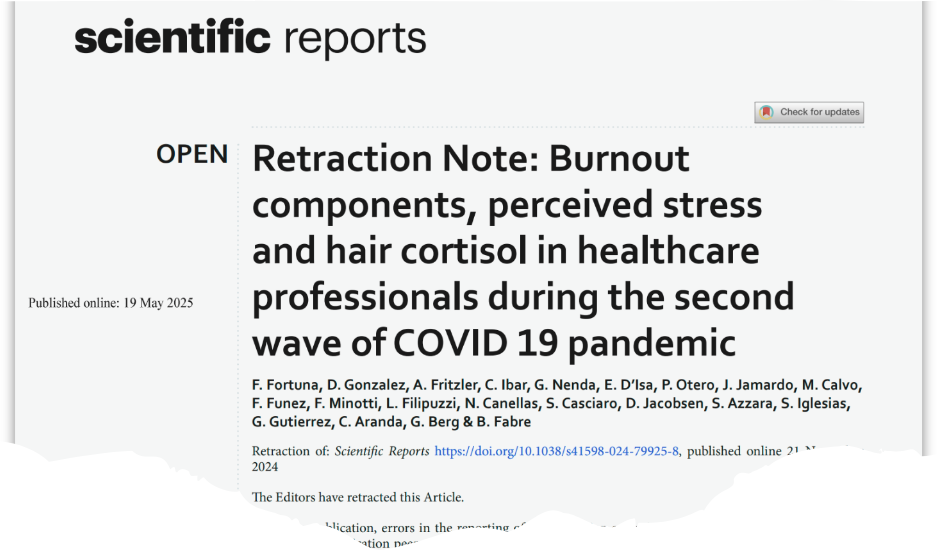The editors of Scientific Reports have retracted an article on burnout because the statistical analysis of its main finding was “unsound.” But the authors dispute the editors’ take on the statistics and claim a mistake in the paper triggered an unfair review.
For the paper, published in November, the authors measured concentrations of cortisol in hair samples from nearly 500 healthcare workers in Buenos Aires to study the effect of the COVID-19 pandemic on chronic stress and burnout. The analysis hinged on a statistical method called mediation analysis.
“Mediation analysis is a method to understand how one thing causes another by looking at what happens in between,” said lead author Federico Fortuna, of the Institute of Physiopathology and Clinical Biochemistry at the University of Buenos Aires. “In our study, we examined whether depersonalisation mediates the relationship between hair cortisol — a biological stress marker — and emotional exhaustion, a key psychological symptom of burnout.”
On the day the paper was published, Ian Walker, an environmental psychologist at Swansea University in Wales, saw the article and noticed something amiss. He posted on Bluesky, “How did editor and reviewers not spot that the (wrongly labelled) mediation statistic sits outside its own confidence interval?” His post included a screenshot from the paper showing the issue.
That was in fact a typographical error, Fortuna conceded. “Neither the reviewers nor we noticed the typo during the peer review process — and yet we all missed it,” he said. What was labeled as the indirect effect should have been the direct effect, and the confidence interval was missing a zero.
The editors at Scientific Reports saw Walker’s Bluesky post and sought clarification from the authors, according to correspondence seen by Retraction Watch. But then a few weeks later, the journal followed up, stating, “We sought advice from our Editorial Board on your article and I’m afraid some further concerns have now been identified.”
What followed was a lengthy back-and-forth, and, ultimately, the paper’s retraction on May 19. The notice reads:
Post-publication peer-review has confirmed that the basis of the mediation analysis itself is unsound. Hair cortisol concentration, emotional exhaustion, and depersonalisation are all indicators of stress and as such investigating causal effects between these is not justified.
The notice continued with some specific details, and concluded: “The Editors no longer have confidence in the claims of this Article.”
But Fortuna said while the way his group presented the stat in question had an error in it, the editors misinterpreted the analysis. “It is widely recognised in the field of mediation analysis that a statistically significant relationship between the independent variable and the mediator is not a strict requirement,” he said. “The non-significant correlation reported [in the study] between hair cortisol and depersonalisation does not invalidate the overall mediation model, particularly given that the indirect effect remained statistically robust.”
Elizabeth Mann, deputy editor of Scientific Reports, declined to comment on the article’s review process.
“It seems the retraction was driven by confusion over statistical methods rather than any actual flaw in the analysis — and it’s concerning that this confusion is coming from the editorial side, not the peer reviewers who originally approved the work,” Fortuna told us.
In a follow-up email, Walker, whose Bluesky post set off the review, said his post was a comment “on an error in statistical reporting that I thought spoke to issues with the peer review process in general.”
Fortuna emphasized that “the only actual error in the paper was a simple typographical oversight — a missing zero in the confidence interval for the direct effect,” he said. “We promptly acknowledged this and submitted the corrected values. Instead of addressing this as a standard corrigendum, the journal opted for a full retraction, citing methodological unsoundness that, in our view, was not present.”
“We stand by the validity of our methods and results,” Fortuna said. “The decision to retract — based on a misunderstanding and a minor formatting error — feels disproportionate and discouraging.”
Like Retraction Watch? You can make a tax-deductible contribution to support our work, follow us on X or Bluesky, like us on Facebook, follow us on LinkedIn, add us to your RSS reader, or subscribe to our daily digest. If you find a retraction that’s not in our database, you can let us know here. For comments or feedback, email us at [email protected].

What is the work of reviewers when articles are being retracted after publication? I mean, if an error is discovered after publication, both parties—not just the authors—must bear the consequences. You can disagree with my point of view.
If we want to be able to hold peer reviewers accountable, they need to be professional, paid, and have other supports.
Sounds like a failure or peer review and perhaps misguided statistical analysis more than a retraction-worthy malfeasance.
“Hair cortisol concentration, emotional exhaustion, and depersonalisation are all indicators of stress and as such investigating causal effects between these is not justified.” This seems like a bold claim in need of retraction itself. If that is the official reason why the journal pulled the paper, then they pulled it for an unsubstantiated conceptual claim — the weakest possible justification.
I have no stake in claiming any specific causal pathway between the attributes the authors measured. But claiming that they are all just indicators and that no direct causal could exist between any of them is just not very believable. As a reviewer, I would not go such a weird claim go uncommented.